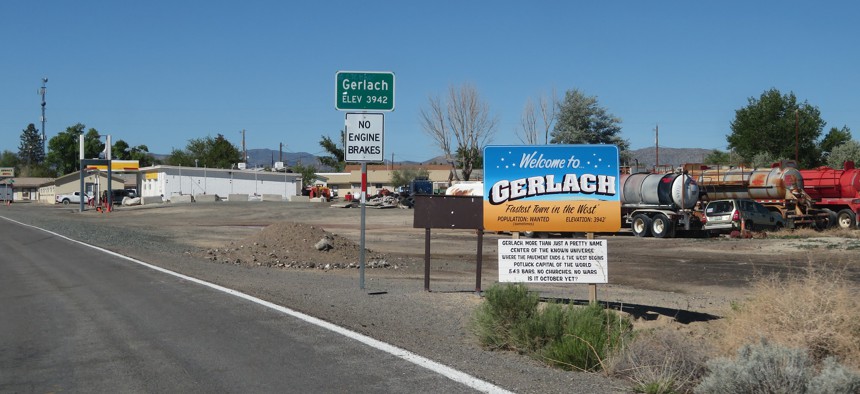
Ken Lund via Flickr
Burning Man Sues BLM Over Geothermal Project
The nonprofit behind the festival says that the agency failed to comply with the National Environmental Policy Act when it ruled in October that the exploration project would have “no significant impact,” meaning it doesn’t require a more rigorous environmental review.
Burning Man is suing the Bureau of Land Management over its approval of a geothermal exploration project in Gerlach, Nevada.
In a filing Monday, the Burning Man Project—the nonprofit behind the festival —argues the agency failed to comply with the National Environmental Policy Act when it ruled in October that the exploration project would have “no significant impact,” meaning it doesn’t require a more rigorous environmental review.
The Gerlach Geothermal Exploration Project proposed by Ormat would be located less than one mile north of Gerlach, Nevada — a gateway town to the event that attracts a temporary city of 80,000 people annually. The town typically holds a population of 120.
Ormat previously proposed a geothermal development project in the same location, but has since withdrawn its development plan and submitted an exploration plan instead.
After analysis of the project site, BLM approved drilling by Ormat of up to 13 exploratory wells and construction of about 2 miles of new access roads and associated facilities across about 5 miles of public land. The exploration project would be the first portion of a potential future large-scale geothermal development project.
Opponents of the exploration project— including Friends of Nevada Wilderness, Friends of the Black Rock High Rock, and a local land owner and resident — fear the project would permanently degrade vital hot springs directly adjacent to the project site.
“After participating in the public process and seeing no movement on our concerns, we filed this lawsuit to help ensure the impacts from the proposed project are minimized, and that Ormat is a good corporate citizen in this environmentally sensitive, economically vulnerable area of Northern Nevada,” said Burning Man Project’s General Counsel Adam Belsky.
In an October letter of decision sent to interested parties, the BLM said they are requiring additional hydrological monitoring before, during, and after drilling in response to analyses and public concern during the project comment period.
Residents and landowners believe the exploration project will directly impact their property interests by laying “the foundation for turning a unique, virtually pristine ecosystem of environmental, historical, and cultural significance into an industrial zone.”
Gerlach resident and Gerlach-Empire Citizens Advisory Board member Andy Moore joined the lawsuit out of concern for the permanent effects to the town.
“No one I know is against green power. What we are against is a company coming in, disregarding our public input, ignoring our questions, giving false statements, and damaging a community in order to fill their shareholders pockets while destroying our quiet nights, our property values, and our peace. There is no gain for this town, only loss from this project at our expense and way of life,” Moore said.
Paul Thompson, vice president of business development for Ormat, said the developer has reviewed the complaint and believes the lawsuit has no merit.
“Consistent with the law and the realities of geothermal development, Ormat undertook government review of its exploration project in advance of pursuing any development,” Thompson said. “Ormat is evaluating whether to intervene in the action, and looks forward to prevailing in the lawsuit and continuing its contribution to Nevada’s green energy, zero emissions future, which will offset some of the copious amounts of fossil fuels the Burning Man Project annually emits in the Black Rock Desert.”
Opponents of the exploration project pointed to a recent lawsuit by the Center for Biological Diversity and the Fallon Paiute Shoshone Tribe to halt another Ormat geothermal energy project near a spring home to a rare Nevada toad. In that case, the U.S. Fish and Wildlife Service determined the planned geothermal development project would likely alter or dry up adjacent thermal spring systems.
Executive Director for Friends of Nevada Wilderness Shaaron Netherton argues the project would “forever alter this region’s amazing viewshed.”
This isn’t the first time Burning Man has gotten tangled in a legal dispute with the Bureau of Land Management. In December 2019, Burning Man sued the BLM over its special recreation permit fee, arguing the bureau has been overcharging it for years. And in 2020, event organizers sued the agency to keep financial information about its event private.
The Burning Man Project has planned, managed, and built Burning Man annually on the dry lake of the Black Rock Desert in northwestern Nevada since 1990.
The company coordinates the year-round, behind-the-scenes work needed to build the temporary metropolis near the Black Rock Desert High Rock. Burning Man Project also owns a number of property parcels in the area and has over 20 regular full-time, year-round employees living and working in the Gerlach region.
“We know this region, it’s our home base,” said Burning Man Project’s Director of Government Affairs Marnee Benson. “Our interest goes beyond the large-scale event we bring here. We’re deeply invested in the community and in creating long-term opportunities for economic development.”
This article was updated with a comment from Ormat’s Vice President of Business Development, Paul Thompson.
Nevada Current is part of States Newsroom, a network of news bureaus supported by grants and a coalition of donors as a 501c(3) public charity. Nevada Current maintains editorial independence. Contact Editor Hugh Jackson for questions: info@nevadacurrent.com. Follow Nevada Current on Facebook and Twitter.






